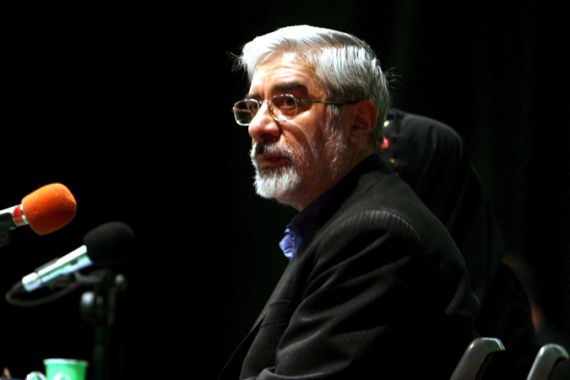Iran ‘will try opposition leaders’
Country’s chief prosecutor insists reformist candidates of disputed 2009 vote will be put on trial.

 |
| A travel ban was issued for Mousavi, left, and Karroubi, right, earlier this month [AFP] |
Iran’s chief prosecutor has insisted that opposition leaders who ran in the disputed 2009 presidential election will be put on trial over anti-government protests that sparked widespread unrest in the wake of the vote.
Abbas Jafari Dowlatabadi’s statement came weeks after the government issued a travel ban for former candidates Mir Hossain Mousavi and Mahdi Karroubi on allegations of being “mohareb” – a term meaning they are ‘fighting against God’.
Hundreds of thousands of people took to the streets across the country in support of Mousavi after the presidential poll, alleging that president Mahmoud Ahmedinejad had won the election by fraud.
But forces led by the Revolutionary Guard crushed the protests, and hundreds of opposition supporters – from mid-level political figures to street activists, journalists and human rights workers – were arrested and tried.
‘Stooges of the west’
In a Friday prayer sermon in Tehran University, Dowlatabadi said that the reform leaders, whom the government accuse of being “stooges of the west”, are criminals who sought to topple the ruling Islamic system through street protests.
“We’ve said many times that leaders of sedition are criminals and charges against them will be investigated. That they will stand trial is definite,” Dowlatabadi said in his address.
“They undermined public trust in the system and disrupted security in the country. Heavy punishment awaits them.
“But since their backing is connected to the dirty hands of the US and the Zionists [Israel], we need to handle the case with more care.”
The repeated government warnings may have a double aim – to discredit the opposition leaders as criminals in the eyes of the public and to test the waters to see if their arrest would prompt a new wave of protests.
Mousavi and Karroubi said earlier this month that they are already living in a “big prison” and didn’t care if they were put behind bars in a “small prison” for defending the trampled rights of the Iranian nation.
‘Cosmetic democratic gestures’
Mousavi recently likened Iran’s ruling system to a North Korean style dictatorship with a few cosmetic democratic gestures and criticised the 2009 election as a coup against democracy.
Demonstrations that erupted after the presidential election presented the biggest challenge the Iranian leadership has faced since it came to power in the 1979 Islamic Revolution.
The opposition said that more than 80 demonstrators were killed in the turmoil, while the government puts the death toll at 30.
Authorities have prevented the holding of major opposition protests since December 2009.
No travel ban had been officially announced for Mohammed Khatami, Iran’s first reformist president who also ran in 2009, but he was forbidden to travel to Japan in April to attend a conference on dialogue between cultures. He has also been called a “moharab” by the government.